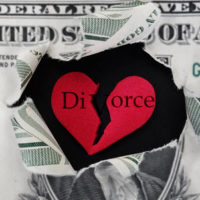Going Bankrupt During a Divorce

 It’s bad enough you have to go through a divorce, but if you are like thousands of Americans each year, you may be worried about how you will keep up with all your bills after a divorce. Huffington Post explains that divorce remains one of the top 10 reasons for bankruptcy. But before you file that petition for discharge in bankruptcy court, make sure you know what you can and can’t do with a bankruptcy.
It’s bad enough you have to go through a divorce, but if you are like thousands of Americans each year, you may be worried about how you will keep up with all your bills after a divorce. Huffington Post explains that divorce remains one of the top 10 reasons for bankruptcy. But before you file that petition for discharge in bankruptcy court, make sure you know what you can and can’t do with a bankruptcy.
Bankruptcy Options
There are basically two types of bankruptcy that an individual can file – Chapter 7 or Chapter 13. A Chapter 7 bankruptcy is considered a “clean slate,” meaning all debts are discharged, and you start over again with a fresh start. Of course, this also means giving up assets and property. It’s unlikely you will be able to keep much of your property, as secured debts will need to be recovered to pay as much of the debt as possible. Plus, not everyone qualifies for Chapter 7. There is a means test. In Maryland, the single-earner income threshold is only about $58,000. If you make significantly more than this, Chapter 7 is probably not an option.
Your other option is a Chapter 13 plan. This type of bankruptcy puts all your assets and liabilities into a plan that is between 3 to 5 years in length. For that period of time, you will make a scheduled payment to the Trustee, who in turn distributes the money to pay off your debts in full or in part. So, in many cases, you still end up paying the debts – just over a longer time period and at a deep reduction.
Things You CAN Discharge in Bankruptcy
Generally, you can discharge most debts. However, there are a few limited exceptions you should be aware of. Here are things you almost always can discharge:
- Credit cards
- Car loans (if you give up the car)
- Mortgages (if you give up the home)
- Personal loans
Here are a few things you can almost never discharge:
- Federal student loans
- Domestic support obligations (child support / alimony)
- Criminal or government fines and penalties
Discharging Property Distribution Orders From a Divorce
There is a gray area when it comes to whether you can discharge a court-ordered division of property. In a court order, the judge may have ordered you to pay your spouse a sum of money. Depending on the specific language of that order, there are limited times when it may be dischargeable in bankruptcy. In general, under a Chapter 7 bankruptcy, these are not dischargeable.
However, under a Chapter 13, they might be dischargeable if they are strictly distribution of property. If the family court judge phrases the award in such a way that it could be construed as a support order, then it is almost certainly non-dischargeable.
Experience Counts When Hiring a Divorce Lawyer
If you are facing a complex divorce or believe you may have to file for bankruptcy following your divorce, make sure you hire an experienced Maryland divorce lawyer who can make sure that your interests are protected now and for the future. Call the Law Offices of Todd K. Mohink, P.A. to get started today.
Resource:
huffingtonpost.com/simple-thrifty-living/top-10-reasons-people-go-_b_6887642.html
Anne Arundel County
Empire Towers
7310 Ritchie Highway, Suite 910
Glen Burnie, MD 21061
Phone: 410-766-0113
Fax: 410-766-0270
Howard County On the grounds of Columbia Mall
30 Corporate Center
10440 Little Patuxent Parkway,
Suite 900
Columbia, MD 21044
Phone: 410-964-0050
